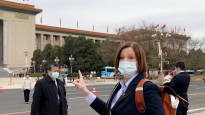Post-corona China is even more firmly under the power of its leader, Xi Jinping. The United States was warned against entering China’s territory under the threat of a confrontation, says our Asia correspondent Kirsi Crowley.
16:01•Updated 16:02
BEIJING Guidelines for Chinese politics are always expected from the annual session of the Chinese People’s Congress.
Now there are even more expectations than usual, because three years of severe corona restrictions shook the economy of the country and its citizens. In the world, relations with the superpower competitor, the United States, are on a collision course.
President Xi Jinping cemented his position as the dictater of the orders of the great power of the East, when he was first elected by the parliament, which was considered a rubber stamp Mao Zedong’s as post-leader for the third reign. A close group of Xi’s trusted men was now chosen around him.
Xi’s word is law. He painted threats and unprecedentedly serious challenges for the coming years. They come from outside. He said during the week of the People’s Congress that Western countries, led by the United States, are trying to isolate, encircle and suppress China.
The most important ones to come the year’s guidelines are related to the superpower race. Xi stressed China’s need to be self-sufficient in technology. He wants to speed up technology and innovation development.
With its sanctions policy, the United States aims to prevent the import of high-tech equipment to China. The race for technological development is therefore taking new rounds and other countries have to think even more about their distribution chains as part of their superpower partnerships.
Based on the speeches of the Chinese leadership, it seems that the tension between the great powers is only increasing. Xi Jinping said at the closing ceremony of the National People’s Congress that he wants the armed forces to become China’s “great steel wall”.
Modernization of the army has been ongoing throughout his reign. The work report of the Chinese government said that the combat readiness of the armed forces in particular must be increased.
Xi repeated the People’s Congress in his closing speech that China will resolutely continue its efforts to reunify Taiwan with mainland China.
The new foreign minister Qin Gang in his press conference last week also took a strong line against the United States, especially regarding Taiwan, and drew borders.
He stirred up the red book of the Constitution and warned the United States of catastrophic consequences if it continued on its current course.
– If the United States does not press the brakes and continues speeding along the wrong path, no amount of guardrails can prevent it from derailing. Conflict and confrontation will surely follow, Qin painted at the press conference.
Qin now put the first one times also the issues of Ukraine and Taiwan face to face. He asked why the United States demands that China refrain from providing arms assistance to Russia, but sells arms to Taiwan, which belongs to China.
This is interesting because so far China has only denied that it is considering arms aid to Russia, while the US has accused it of intentions.
The new prime minister Li Qiang’s his competence as the country’s top financial director has been doubted. Li is one of Xi Jinping’s closest confidants. A year ago, he led a long and difficult corona lockdown in Shanghai as the leader of the big city’s Communist Party.
He is expected to implement the president’s ideological policies, which have already shaken the real estate sector and technology production in recent years.
At the press conference at the end of the People’s Congress, however, Li appeared to be pragmatic. He expressed confidence in China’s private sector and promised it vitality. He admitted that China’s economy still faces challenges, and even the moderate five percent growth target is not easy to achieve.
